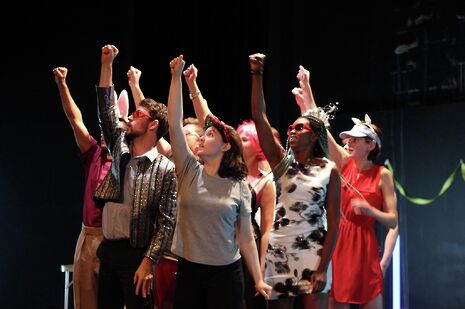Review: Romeo and Juliet
While the Pembroke Players’ Japan Tour production of Romeo and Juliet was vibrant and energetic, the speed of delivery at times compromised its emotional impact, writes Vanessa Braganza

“But, soft! What light through yonder window breaks?” If you have seen the Pembroke Players’ recent production of Romeo and Juliet, you’re more likely to think of rainbow LED lights than the sun.
Historically, audiences haven’t been known to seek out Shakespeare’s most popular tragedy in search of a good belly laugh or a lively dance number – nonetheless, this is ironically what they are likely to find in Cambridge’s latest production of the famous drama. Transposed into the 21st century and sprinkled with a generous helping of pop hits throughout, the sheer spectacle of this production is well conceived by the director, George Kan, and is highly entertaining. Where else is one likely to witness a courtly gathering turned late-night rave, complete with Lady Capulet wearing a hot pink wig and a Shakespearean cast of characters jamming out to Rihanna and Maroon 5? The play counterintuitively but skillfully harmonises a modern setting and minimal props with a poetic Renaissance text, creating a refreshingly new take on one of the world’s best-loved dramas.
This production is particularly astute at surprising its audience with comic interludes. Yasmin Freeman’s antics as Juliet’s notoriously garrulous nurse make for a wonderfully funny performance. Whether she is flirting with an unsuspecting Friar Laurence (William Ashford) or simply blowing up balloons in the background, Freeman manages to steal every scene in which she appears. Additionally, Ashford’s rich tenor rendition of The Zutons’ ‘Valerie’ after he weds the lovers inspires both admiration and hilarity.
The primary weakness of this production, however, is the extraordinary rate at which the dialogue moves, which muffles the emotional impact of the most important speeches. Ciaran Green (Romeo) delivers most of his lines – including the famous ‘balcony speech’ – at the speed of an auctioneer, and manages to steamroll over some of Shakespeare’s most beautiful poetry in the process. Emma Corrin, resplendent in a beautiful Juliet-red dress like that made iconic by Olivia Hussey, plays a heartfelt and often moving Juliet. There is a passionate and earnest quality to her voice that infuses the character with an endearing sweetness and innocence. However, there is a general lack of onstage chemistry between the two star-crossed lovers, stemming largely from the fact that many lines are simply delivered too fast to be savored.
Justin Blanchard’s energetic performance of Mercutio brilliantly captures the erratic idiosyncrasies of one of Shakespeare’s most difficult characters. He adeptly uses expression and elaborate gesture to make Mercutio’s manic fantasies come alive, and the effect is alternately comic and intensely poignant: the alacrity with which Blanchard’s amusingly deranged antics devolve into a far more menacing derangement at the moment of his death testifies to his dynamism as an actor. Mercutio’s famous delivery of “[a] plague o’ both your houses” is the play’s most chilling moment, and serves as the major transition point between the relative levity of the first half and the tragic overtones of the second.
The choice to cut Juliet’s already abbreviated death speech to a couple of words renders it too quick to be poignant. However, the directorial omission of Lord Montague and Lord Capulet isn’t particularly conspicuous, and this economy of characters works well for the play. Dolores Carbonari has an immense stage presence as the imperious Lady Capulet, and the reassignment of the play’s famous final lines to the grieving Lady Montague conveys quite beautifully the loss of the two protagonists.
While this production lacks the “sweet sorrow” that makes us feel intensely the plight of the ill-fated lovers, it is overall an innovative and sometimes brilliant re-presentation of a beloved story.
 News / CUP announces funding scheme for under-represented academics19 December 2025
News / CUP announces funding scheme for under-represented academics19 December 2025 News / SU reluctantly registers controversial women’s soc18 December 2025
News / SU reluctantly registers controversial women’s soc18 December 2025 News / Cambridge welcomes UK rejoining the Erasmus scheme20 December 2025
News / Cambridge welcomes UK rejoining the Erasmus scheme20 December 2025 Features / Should I stay or should I go? Cambridge students and alumni reflect on how their memories stay with them15 December 2025
Features / Should I stay or should I go? Cambridge students and alumni reflect on how their memories stay with them15 December 2025 Film & TV / Timothée Chalamet and the era-fication of film marketing21 December 2025
Film & TV / Timothée Chalamet and the era-fication of film marketing21 December 2025









